This piece contains truckloads of spoilers for the Netflix series “Hollywood”
Ryan Murphy’s star-studded Netflix series Hollywood presents an alternate history of 1947-9 tinseltown where the good guys win, the bad guys grow, and opportunity is available to us all. By combining fact and fiction, Murphy and his team — most notably Janet Mock who serves as a writer, director, and EP — have created an ambitious fairy tale of a series.
The show begins — like so many stories then and now — with a cis straight white guy named Jack (David Corenswet). But as Jack gets involved in sex work to make ends meet we’re introduced to a world of characters we rarely see thrive in this era. Archie (Jeremy Pope) is a black gay screenwriter who’s had his script accepted after an anonymous submission. Raymond (Darren Criss) is a mixed race Filipino director, passing for white, who is on the precipice of success. Camille (Laura Harrier) is a black actress with all of the talent and none of the opportunity. And the studio is run by women (Patti LuPone, Holland Taylor) and gay men (Joe Mantello, Jim Parsons). We’re even presented with alternate histories for Rock Hudson (Jake Picking) and Anna May Wong (Michelle Krusiec) — what could their careers have been like if they faced even slightly less prejudice?
The opening credits show the characters climbing up the Hollywood sign. They reach down and help each other get to the next rung of the ladder. It’s a corny and obvious metaphor, but every time those credits rolled I felt my emotions burst with possibility. And more often than not, I felt that same silly joy and imagination during the show itself.
There is so much to discuss beyond my emotional response. And since Riese, Carmen, and I all have very strong feelings about Ryan Murphy and the history of Hollywood, we decided to have the detailed conversation I think the show deserves.
Riese: Hello!
Drew: Hollywood!
Riese: The land of dreams!
Okay to start off… did you like it? The program. Janet Mock’s Hollywood.
Carmen: I think you and Drew should go first because… I did not like it! (I’m sorry!)
Riese: Oh wow, that’s fascinating!!!
Okay, I loved it. I also watched it on a day when I was: 1. Feeling terrible in general, 2. Doing a really great jigsaw puzzle while watching. So that may have impacted my experience. I didn’t even plan to marathon it all that day, I just wanted to.
I didn’t like the finale, but up to that point I found myself very amiable to it. It felt like a fun and hopeful idea to witness during a time period that is not fun or hopeful (the present).
Drew: I did like it. But here’s the thing. I also like Hollywood… not the program. The place, the concept, the disaster. I can’t help myself. I love watching the Oscars. I still get emotional when I hear corny stories of stardom. Since childhood, I’ve certainly become more aware of the complications of “Hollywood” but I can’t help my visceral love of it.
Riese: Interesting! I know a lot about this time period specifically because there is so much literature on it and I’ve done so much research on the bisexuals and lesbians of the era so it was compelling in that regard.

Top Most Sexually Prolific Lesbians and Bisexuals Of Old Hollywood by Riese Bernard (2016)
Riese: The idea of the show sounded crazy, and a bit ham-fisted I think! But in execution I was like, oh wow, this is so nice, I love this imaginary universe where this could happen! Although as the series went on, for me, it shifted from “this is how things could have gone differently” to “this is science fiction.” It stopped being an alteration of history and became a somewhat absurd fantasy.
When Archie decided to walk the red carpet holding his white boyfriend’s hand in 1948 and it somehow all eventually worked out in the end! I was like Jesus fucking Christ, let’s reign it in everybody.
Carmen: Yes. That moment was both somehow beautiful and a double fisted groan, all at once.
I’m a lot like Drew, I love Hollywood, the industry, even when I shouldn’t. I think on some level that’s probably true for all three of us. It’s part of what has drawn us to what we do for a living (which involves a lot of… writing about Hollywood) — but I couldn’t get past the tone of the show. As much as I enjoy the upside-down world that is Ryan Murphy’s mind, his penchant for It Gets Better storylines work best for me when they are also cut with his own wit.
Hollywood felt like the most earnest episode of Glee… for 7 hours.
Riese: Mmmmm good point. There was no edge.
I wonder if I’d seen it pre-pandemic if I might not have liked it as much as I did. But things are so terrible that I was like, okay sure let’s go along with everything working out all the time.
Carmen: There’s a once-in-century virus eating away at the fabric of everything we know about how to live, just let the gays kiss for once! Let women of color win the fucking Oscar! We can never go outside again!
Riese: Hahahaha. I was like “surely, somebody involved in this production will lose.”
Drew: For me, the edge is provided by the reality. My favorite episode was probably the second one, “Hooray for Hollywood: Part 2,” when we’re first introduced to Raymond, Archie, and Camille. I felt really invested in this naive feeling of “Fuck it. We can do this. We can!” When Raymond is talking to Anna May Wong, the show is grounded in the reality of that era (and honestly our current era) but combined with this sort of silly optimism. We’re shown how Hollywood actually treated her in a way that felt visceral to me knowing her story and I hope felt visceral to others learning about her for the first time. I want to believe Raymond could change the course of her life even if I know it’s mere fantasy.
Riese: Carmen, did you dislike it the entire time or did that happen gradually?
Carmen: I disliked it pretty early on to be honest? The reality break for me was when we moved from Peg to Meg, between episode 3 “Outlaws” and episode 4 “(Screen) Tests.” It’s not that I don’t love seeing black people win, of course I do! I’m very Issa Rae about mine — always rooting for everyone black — but the break from reality was just so over the top. I found there was no room for me to root for them! Because the stakes felt fake almost right away.
Riese: Mmm yeah, there were no stakes that could not be overcome by Darren Criss’ optimism!
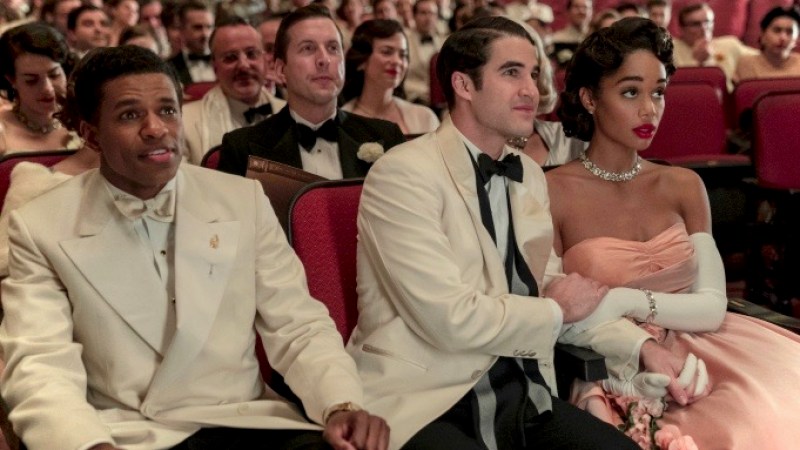
Jeremy Pope as Archie Coleman, Darren Criss as Raymond Ainsley, and Laura Harrier as Camille Washington.
Drew: I agree it goes too far. It loses that necessary grounding. But for me it wasn’t the winning of the Oscars. I think there’s room with what this show is trying to achieve for that kind of fantasy. When Camille wins I just thought about Halle Berry’s acceptance speech. I thought about how many more decades it would actually be and how much farther even now we have to go. I also thought about Moonlight winning and how special that was. I don’t know! I was aware the whole time that it shouldn’t be working for me, but more often than not it just was?
It feels like it becomes less about what was actually possible and more about the push so many have done for decades to try and get us to where we could be.
That’s not to say I didn’t have MAJOR issues with some stuff in the middle. I can certainly get into that.
Carmen: “It feels like it becomes less about what was actually possible and more about the push so many have done for decades to try and get us to where we could be.” Yes, but the reality of that length of time, the decades of push, is also a part of our story? It’s hard for me to get into, for instance, oh man if Rock Hudson had just come out in the 1940s and a black woman got to play a lead instead of maid, imagine where we could be now! The truth is, we wouldn’t be us if those things happened.
Drew: I think there’s something inherently off about the premise. Which is why I went into the show with very low expectations. But then… I just… cried.
Riese: I also cried.
Carmen: I think that Halle Berry’s speech and Moonlight are great examples. They are exactly where my mind went as well. But what makes those moments so historic and weigh heavily in memory is that they broke ceilings facing nearly a century of Hollywood racism by that point. Halle Berry’s speech is iconic because she names Hattie McDaniel, Lena Horne, Dorothy Dandrige, Diahann Carroll, all the black women who never got to walk on that stage. A fictional Camille winning an Oscar at what’s essentially the beginning of her career doesn’t have quite the same impact.
Whoops sorry I’m being a downer!
Drew: Oh my God, no you’re not! You’re 100% correct. But the weight for me exists in the knowledge of that history. Imagine what those performers could have done in an industry that appreciated them.
Carmen: That’s a good point. I also wonder if that aspect would have worked for me better if it had been rooted in a real black woman’s story as opposed to a fictional character. What if instead of Camille, the production imagined a word where a 20-something Dorothy Dandrige or 30-something Lena Horne was given her proper due on an Oscars stage? There was so much potential depth with Anna May Wong, but she felt almost an afterthought compared to fictional women that we had little time to get to know.
Riese: Also, there is the issue of the Hays Code? I was confused about that. It’s mentioned early in the series, and then apparently just… stops applying? The Hays Code forbid same-sex relationships and interracial relationships in film.
Carmen: YES. I’m glad someone said it!
Riese: If they weren’t going to abide by the Hays Code, then why did they even bother to mention it?
I think what’s interesting is that in the 1930s there was a slight edge of hope towards portrayal of actual life in all its diversity on screen. It’s a time period I think people honestly forget happened. We think of pop culture getting less conservative over time, rather than there being a more liberal time that actually led to those in power to find a way to reverse course. (I feel like Reconstruction is often glossed over in the same way.) There are exceptions: I think most are aware that the liberalism of the 70s birthed the conservatism of the 80s. But when it comes to film and television I’m consistently surprised by ahistorical perspectives on it. There were way more films centered on Black people and women in the 80s and 90s then there were in the 2000s. But everybody seems to forget that? Like when Bridesmaids came out and everyone was like FINALLY A FEMALE-FRONTED COMEDY. I was like, did you literally just get born???
Anyhow! The Hays Code was in response to that increased post-WWI liberalism. We got our first onscreen lesbian kiss in a “talkie” in the 1930s. Anyhow, the Hays Code to my understanding was in FULL effect during this time period, which followed WWII — another era where things “went too far” in terms of issues like the acceptance of women in the workplace and same-sex relationships.
Drew: Yes!! I think that’s a great point and something I try to talk about a lot when framing film history. The idea of continued progress is just false.
Riese: Correct.
Drew: If I could watch any show about early Hollywood I’d want to see something grounded in reality about Oscar Micheaux or Dorothy Arzner. But that’s not what Ryan Murphy was going to give us. And that’s not what this series is trying to be.
Riese: There was a butch lesbian in it for like 10 seconds and I was like IS IT DOROTHY??!
I think what happened for me watching this was at first I was comforted by the conceit that later felt absurd. Because I’m so tired of seeing movies about women and people of color who can’t get ahead because of systemic misogyny and/or racism. For instance, when they wanted to change the author of the script to be a white author I was like oh god must we endure this sad and fucked up situation we’ve seen already 5000 times again?. So when he got to keep his name on the script I was like YAY I LIKE THIS BETTER!!!
It soothed me.
Drew: Yes, the show is pointedly not challenging in that sense and I guess the debate is whether that makes it artistically bad and/or morally irresponsible.
OR is there value in simply putting images of success on screen unexamined. Does that open up space for more of that? Or is it too easy?
Riese: I personally don’t think it was morally irresponsible or artistically bad — I enjoyed it a lot! To me it just felt like a missed opportunity to do something more nuanced.
Drew: I also think the question to me becomes “is this a show about the 40s or is it a show about today that’s simply using iconography from that era.”
I think it’s more that we have to move forward as if all possibilities are possible. We have to pretend like this could’ve happened in the 40s. We have to be foolish. We have to try and tell our stories and lift up other stories and ignore reality. It’s the only way to make our reality even slightly better. And when the stakes are as high as the images we see on screen it’s worth that foolishness.
That’s what I got from the show when it was at its best. I don’t think it’s actually a question about whether this could have happened in the 40s and what that would mean for today.
We’ve been joking calling it Janet Mock’s Hollywood, but I don’t think this show exists if Ryan Murphy doesn’t have the experience of making Pose.
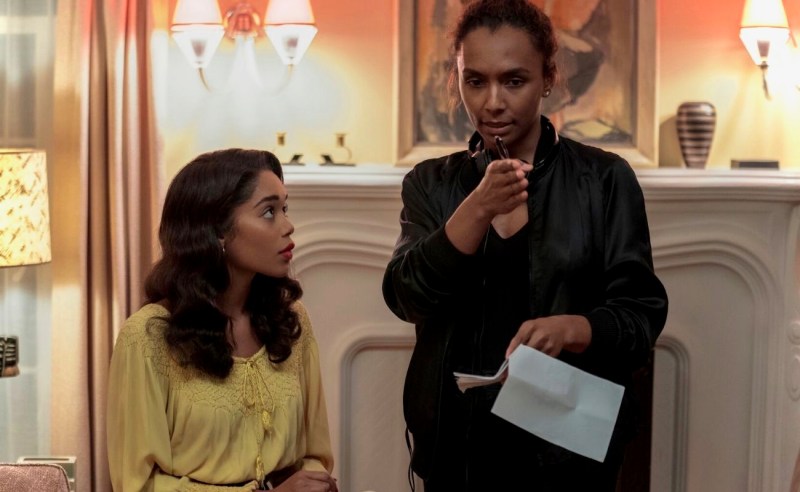
Hollywood writer, director, and EP Janet Mock with Laura Harrier
Carmen: Oh Drew that’s interesting because I had to stop calling it Janet Mock’s Hollywood, even as a joke, about 1/3 of the way through. Janet Mock wouldn’t make a series that so completely centered on the desires of cis white men, and I won’t disparage her name by saying she would.
Riese: There were parts to me that felt very Janet Mock though — like Hattie McDaniel’s mentorship of Camille.
Drew: The moments that didn’t work for me were the Eleanor Roosevelt deus ex machina and when Claire throws her audition. Those were the times where it felt like straight white people were swooping in to save the day in a way that felt counter to the entire point of the show.
But what I loved seeing was the ways in which different character’s marginalized identities made them want to lift up the voices of other marginalized identities: Raymond knowing he could pass so writing a role for Anna May Wong; Dick realizing his shame around his own identity and then deciding to take a chance on others now that he had power.
Carmen: I thought the entire series was about white people swooping in to save the day.
Drew: I think that’s very fair. haha
Riese: But if white people were the only ones with any power, who else could save the day?
Drew: I guess it felt personally motivated in situations other than those two that I mentioned. When it’s Avis wanting to use her rare power as a woman in Hollywood or Dick as a gay man it worked for me.
Of course we know that is NOT how it works. White women and white cis gay men do not usually lift up others once they gain power. lol
Carmen: (Paging Ellen DeGeneres)
Riese: I think it’s something done well in Glee, with having football players support Kurt when he was getting bullied, that also happens here, is being like “hey [power class], this is what you COULD be doing.” Like let me just plant this seed for you.
It did feel like “the making of POSE” story to me.
Drew: Right, it feels very much like Ryan Murphy’s journey to learn how to use his powers for good. (Which took him a long fucking time, I say as I struggle through the fifth season of Glee.)
Carmen: I think part of “learning to do the right thing” also means not… writing a seven-hour allegory about how you did it.
That’s not how allyship works.
Drew: !!!!!
Carmen: Sorry I REALLY DIDN’T LIKE IT CAN YOU TELL
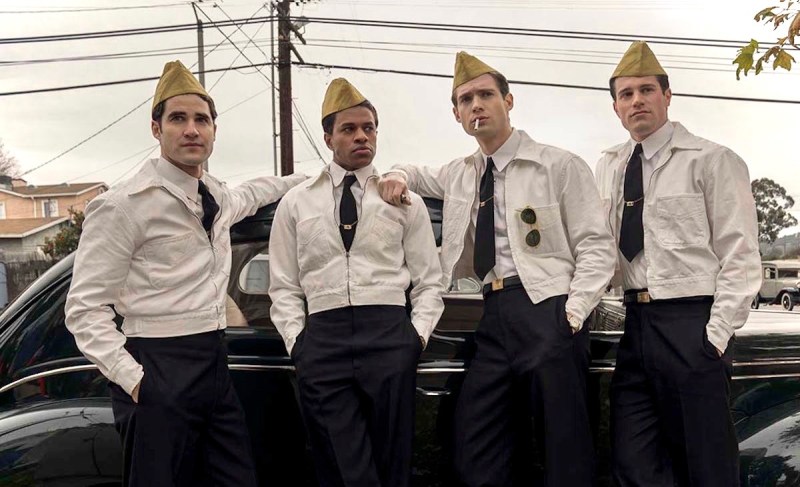
Darren Criss as Raymond Ainsley, Jeremy Pope as Archie Colema, David Corenswet as Jack Castello, and Jake Picking as Rock Hudson
Riese: Do you think you would’ve liked it more if you’d expected less from it? Like I went in expecting nothing and was surprised that I got invested right away. But then I texted you and Drew that you had to watch it ’cause I loved it.
Carmen: For me to have liked Hollywood, this is what I would have needed:
1. Less of Ryan Murphy’s core instincts to write white savior narratives.
2. More of the sex work and working class storylines. I found those to be infinitely more satisfying than the “how we make a movie” plots — I love movies, but it is very hard to write a good “how to make a movie” script. I found the great Patti LuPone infinitely more interesting as Jack’s client than a studio boss. Very surprisingly, my favorite character in the series was Dylan McDermott! I thought he was great.
3. I needed infinitely more backstory and full life for the characters of color! Why did we never learn more about Camille’s roots or how she got to Hollywood? Why didn’t I get to meet Darren Criss’ Filipino family? Does he never call home? Anna May Wong’s win could have held more resonance, if we spent more time with her in flashbacks. She has such a rich real life history!
I don’t have anything against Rock Hudson, and I think Jim Parsons deserves an Emmy for this role, I really do. But wow with 7 hours there is a lot of room to give all the characters of color more lives to live.
Drew: I think what you’re describing is an objectively better show! I just never would have expected it from this. Again, I’ve spent all quarantine watching Glee. lol
Carmen: LOL
Riese: Yeah, it was weird at the end how they inserted these anonymous, sudden, random audience members watching The Oscars from home and feeling inspired. That was one of my least favorite moments.
Drew: I HATED THAT.
Riese: It was corny and self-congratulatory and, again, ham-fisted. But those scenes could’ve been their actual families and friends and communities instead of … extras?
Carmen: YES! That’s when I lost it! I was like, “oh who are these random Asian people” and that was quickly followed with “oh ok, you couldn’t be bothered to write other Asian characters beyond Anna and Raymond earlier, so now I’m supposed to map my emotions onto strangers.”
For a second I thought the random black stranger was actually Archie’s brother? And then I realized… nope another extra.
Riese: Same.
I loved the pilot because I thought it was a fun sex work story which was refreshing!
Carmen: Same!!
Riese: There were so many times when i was like “ugh I know where this goes” and it went somewhere else. Right now in this time and place it was comforting, because lately “ugh i know where this goes” actually goes someplace even worse I hadn’t considered before.
Drew: Have either of you seen Julie Dash’s Illusions?
Riese: No.
Drew: It’s amazing and I want everyone who reads this to watch it. I think it acts as a perfect counter to this show in that its themes are the same and it’s a revisionist history of this time, but it’s actually grounded in reality.
It’s a half hour short and not a seven episode series, but in some ways I think it shows what this could have been.
Carmen: OK I WILL WATCH THIS. I will watch anything Julie Dash makes.
Drew: Carmen, did the sections that focused on Archie and Camille and even Raymond and Rock work for you? Or did it feel connected to the overarching lack of realism?
Carmen: What I loved: When Queen Latifah sauntered out in her bathrobe as Hattie McDaniel and made out with Tallulah Bankhead before congratulating Camille on not having to “play a fucking maid.” (Though colorism is VERY real; while I get the urge to hire Queen to play a swaggy black lesbian because she’s very good at it for obvious reasons, she looks nothing like Hattie McDaniel. That was a big mistake.)
I loved Tallulah Bankhead.
I loved all the queer women.
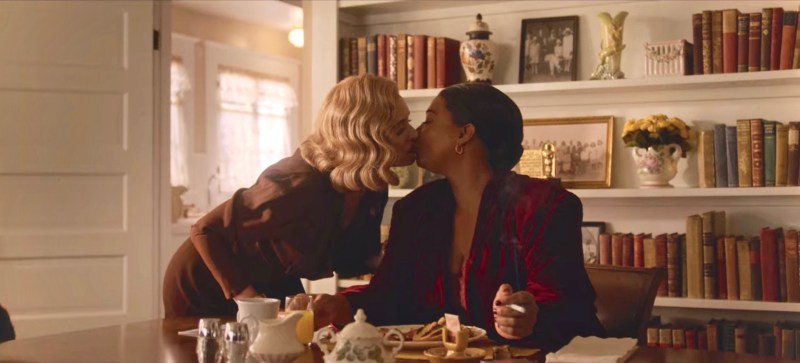
Paget Brewster as Tallulah Bankhead and Queen Latifah as Hattie McDaniel
Riese: I loved that Hattie/Tallulah moment SO much, because that connection is a very obscure one — it’s not discussed as openly or with as much confirmed details as most other hookups of the era.
Seeing Hattie/Tallulah linked sexually onscreen DELIGHTED me beyond measure.
Drew: Riese and I were texting and she was so shocked I thought something AWFUL had happened.
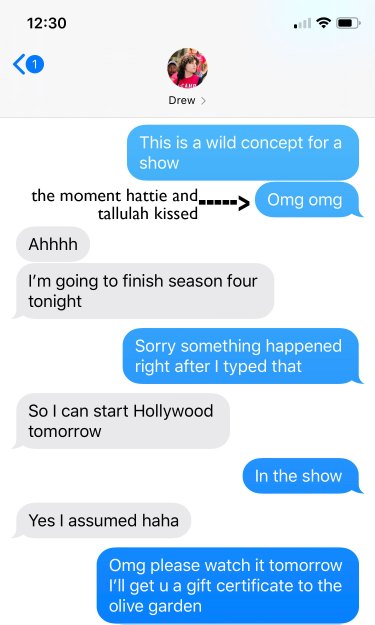
Exhibit A
Drew: When I got to that episode I was waiting for a character to die tragically or something. And then I was like WAIT it’s just amazing gay stuff!
Carmen: I loved it! It’s hands down my favorite 5 minutes in the series. The one thing I knew Ryan Murphy would deliver on is some 1940s queer women and praise be, he did.
As I mentioned, I was less than excited about Queen Latifah’s casting. Hattie McDaniel is personally a very important historical figure for me (when I was a tween, I had a black and white photo of her winning the Oscar tapped to my Caboodles makeup case. #Nerd). I was very hurt by the decision not to hire an actress that physically resembled her for the part, particularly by not hiring a dark skinned actress!
Then Queen Latifah sauntered out the bedroom and told Tallulah “come ‘here” and for a half second I almost forgot my rage. Damn I loved it. And of all the re-imaginings that Hollywood asks of me, re-imagining Hattie McDaniel as a hot babe is one of my top joys.
I also thought Latifah did a beautiful job retelling the famous story of Hattie McDaniel not being allowed into the room when she won her Oscar. And I loved the small nod to the women queer sex workers in the penultimate episode! Maybe what I wanted was for Hollywood to just be a 1940s version of The Chart starring all my favorite historically famous lesbians.
Drew: Being a fan of Ryan Murphy is an exercise in cognitive dissonance.
Riese: Hahaha!
Carmen: Hahahaha! The Truth!
Riese: I mean also the cast!!! Was so good!! I loved Holland Taylor and also really liked Dylan McDermott.
Carmen: Ok wait YES Holland Taylor came to eat up that screen! I wish more people gave her the opportunity to work like that these days. She is so talented.
Drew: She’s really incredible.
I also loved Joe Mantello. I think so much of what worked in the show’s later episodes worked because of his performance. He seemed to be grappling with his character’s reality and the reality around him in a way the show wasn’t always doing.
Carmen: YES. All caps Yes.
Drew: I understood why he made the choices he did and it reduced some of the white savior elements for me personally.
Also just want to shout out Michelle Krusiec as Anna May Wong. I think she was my favorite part.
Because of her performance the Oscar win felt… I don’t know! I’m still grappling with this and what it accomplishes and whether it’s ultimately good or not. But I felt deeply emotional during her speech.
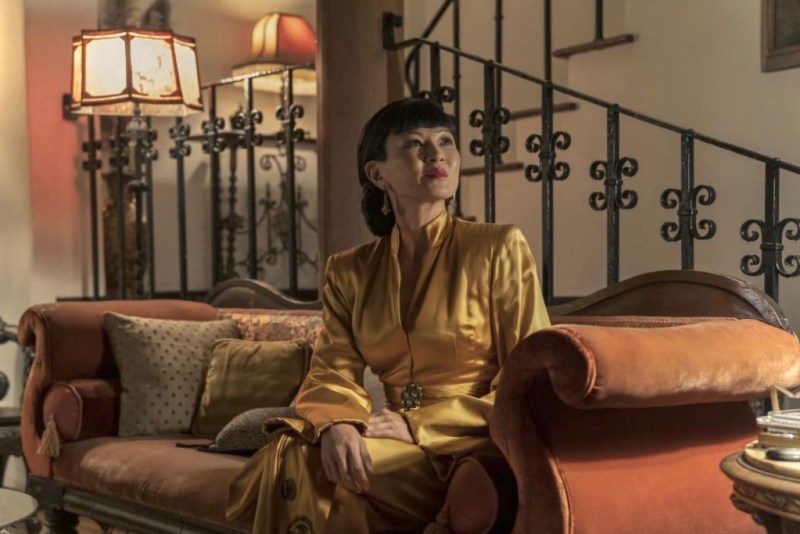
Michelle Krusiec as Anna May Wong
Carmen: Her Academy Award speech was everything! She gave such love and respect to Anna May Wong. You could feel the reverence.
Drew: Watching her win an Oscar and watching Rock Hudson be out of the closet did feel healing — potentially in a cheap way, but healing nonetheless.
If this show gets people to learn about Anna May Wong and watch her work I’ll consider it a net good.
Carmen: I think that’s actually the thing! I wish Hollywood kept all those top tier moments for Joe Mantello (who I agree worked magic in the last set of episodes) and Holland Taylor and Dylan McDermott; but I wanted that same quality of story for Michelle Krusiec, who was so deserving of it. I think that’s how you move out of white savior narratives. It’s not just about the white characters having the most screen time, or even who has the power to make the decisions on how things get made — it’s about who gets to display the full breadth of their humanity on screen.
Drew: Absolutely.
Carmen: I think Archie in particular needed more development. Archie has this one STAND OUT scene with Camille, right after they take his name off the script in episode three. He goes to her house and tells her to fuck all the rules and do whatever she has to in order to get the part, because he’s realized playing by the rules won’t work in a racist system. That scene had such clear motivation and Jeremy Pope worked so beautifully with that material. I wanted more of that for him.
Drew: When I think of Archie’s character, I think of that scene. But you’re right, we should’ve had more of that.
Carmen: I liked Rock Hudson a lot!
Riese: Yeah I did like Rock’s character. He was funny.
Carmen: Raymond didn’t work for me. I think also because he’s so obviously Darren Criss, who is also a white passing, mixed race Filipino and has had publicly conflicted feelings about that.
It felt like, once again, writing a meta-narrative into the show as a form of a mea culpa, which never works well for a Ryan Murphy production, if you ask me.
How could that have worked better? Let me get to know Raymond’s family, let me see some pain involved in when he’s actually had to bite his tongue and pass, show me a flashback. Give it teeth. Something!
Drew: That’s totally fair! I would’ve really liked that also!
I think Raymond felt grounded in the same way that Archie submitting his script without anyone knowing his race felt grounded. And it’s why that first episode with them worked best for me. It was a fantasy, but I felt like I could imagine how it might have happened.
I think Ryan Murphy takes these absurd big swings and creates these moments that are such magic and so unlike anything else we’re seeing on television. And my instinct is always to celebrate that? I also want to critique his missteps, of course. But I’ve come to realize how forgiving I can be to a work as a whole if I feel like it’s attempting to do something special.
Riese: Yeah, I mean he is a high concept man. I think he’s a genius. But he also aims high and falls spectacularly a lot of the time.
Carmen: The thing is I talk a lot of shit about Ryan Murphy, and he deserves most of it, but I keep coming back. He’s onto something. And if you are talking about queer television, there’s no denying his impact. (There’s also no denying his harm. And that’s the rub.)
Riese: I do think there weren’t enough lesbians though! Anne May Wong was bisexual and that should’ve been in there like in the form of a sex scene. :)
Carmen: I fullllly agree!
Drew: There is a show about the Sewing Circle waiting to be made and it is not this show. But I also don’t want Ryan Murphy to make that show. I want us to make that show.
Riese: Yes I want to write that pilot.
Hollywood is now streaming on Netflix.



I just watched it all today, mostly of curiosity because I watched Scotty and The Secret History of Hollywood, the documentary about the real life “Ernie” character, a while ago. (I thought on Netflix but it isn’t there anymore, I wonder if they took it down cause of this show for some reason?)
It definitely felt very science-fiction-y fantasy by the end which was a Choice. I personally didn’t like it, I still watched it all but pretty early on was skeptical. The part that felt way too Ryan-Murphy “learning to do the right thing” and then writing about it in a self-congratulatory way, was the brief and sudden Dick Samuels funeral when Ellen Kincaid kind of alludes that he alone was the true pioneer that led to of all these movies with women and people of color. As if we hadn’t just watched a whole lot of hours about it being a team effort, but no its the gay white man executive who really made it happen. It was a fast scene but made it clear to me just how much all of the other fantasy stuff didn’t work and why.
I liked it in general but see the point of Carmen to really dislike it. I had an argument with a (male) friend who said he didn’t like the whole concept. He is a huge Tarantino fan and though I am sometimes really annoyed by Ryan Murphy, Tarantino is just a big no no for me.
how about ryan murphy writes julie dash a check equal to or greater than the budget for this show and she makes whatever the hell she wants?
Hear! Hear!
I am not going to watch it, because it’s a little out of my wheelhouse anyways, but I enjoyed reading your thoughts, and will definitely be watching the Julie Dash film!
I agree that Ryan Murphy shows require cognitive dissonance. He comes up with these great ideas and characters that have a lot of potential. Then kinda gets in his own way, but I appreciate the effort. Not enough cis white guys are trying to do better.
I have lots of criticism for the guy, but I can see that he’s kept trying over the last decade. Glee is painful to watch, a lot of the time, but then you watch Pose. You can see how he grew as a producer and show runner. He’s still got a long way to go, but I’m glad he’s still listening and putting effort in. I’m really curious what his next steps will be in the 2020’s.
While, I agree that this was pretty self congratulatory, I don’t think it’s totally a bad thing. It shows an example to other people in power, of how to use that power to uplift others. I know it’s a low bar, but sadly, I think a lot of people need to see that example.
Also, I’m always down for an idealized version of something. We’ve seen a lot of bigotry and loss with movies, in our community. Thing’s are also pretty depressing here, in modern times. So, it’s nice to see a world that isn’t so cruel.